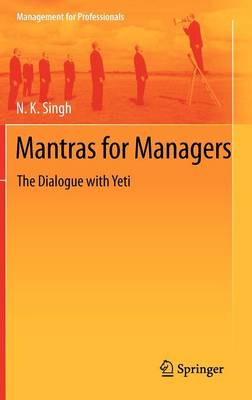Management for Professionals
2 total works
The innovative book will stimulate thinking of corporate managers on key issues of organisations and management. The imaginary dialogues in the book represent the inherent conflict between logical cut-throat competitions rampant in today’s world and the inevitable need to retain natural grace of values.
It deals with the key issues of mission and objectives of organisations, understanding people and bringing changes in organisational culture. Future development in socio-economic sphere will be greatly influence by values and attitude of people in various organisations. “Mantras for Managers” is a window on the new humanism in organisational and institutional development.
It deals with the key issues of mission and objectives of organisations, understanding people and bringing changes in organisational culture. Future development in socio-economic sphere will be greatly influence by values and attitude of people in various organisations. “Mantras for Managers” is a window on the new humanism in organisational and institutional development.
This path-breaking book liberates management thinking from a century of Western subjugation. It is a comparative exposition of culture and management styles in India, Japan, China and major Western countries.
There is a need to protect and sustain each country’s identity and positive strengths in values while interlinking global business with cross cultural empathy. The book explores profiles of culture-management axis through secondary literature study in various languages of the East, empirical research conducted with nearly one thousand managers and 375 organizations in India.
The effective management in the next millennium will be mission-based strategic integration of the team, combined with people-sensitive approach. In spite of growth of hi-tech, the emotional human issues will dominate the coming decades. Happiness and health in institutions will largely depend on successive sacrifice of greed and possessiveness in creation of wealth for human development. The meltdown in the US and its repercussions in the world are direct outcome of failure to learn these lessons.
Already the world is witnessing acute consciousness of interdependence and universal linkages. This is the quintessence of Vedanta, Zen-Buddhism and Sufi order in the Eastern globe. West-dominated management technology must now synthesize with Eastern intuition and values.
The book is divided into three parts: First part delves into East-West psyche; second part presents Integration-Affection Model as potential approach to effective Management. Third part shows the author’s successful applications of the approach in different organizations while working as Chief Executive or Consultant.
There is a need to protect and sustain each country’s identity and positive strengths in values while interlinking global business with cross cultural empathy. The book explores profiles of culture-management axis through secondary literature study in various languages of the East, empirical research conducted with nearly one thousand managers and 375 organizations in India.
The effective management in the next millennium will be mission-based strategic integration of the team, combined with people-sensitive approach. In spite of growth of hi-tech, the emotional human issues will dominate the coming decades. Happiness and health in institutions will largely depend on successive sacrifice of greed and possessiveness in creation of wealth for human development. The meltdown in the US and its repercussions in the world are direct outcome of failure to learn these lessons.
Already the world is witnessing acute consciousness of interdependence and universal linkages. This is the quintessence of Vedanta, Zen-Buddhism and Sufi order in the Eastern globe. West-dominated management technology must now synthesize with Eastern intuition and values.
The book is divided into three parts: First part delves into East-West psyche; second part presents Integration-Affection Model as potential approach to effective Management. Third part shows the author’s successful applications of the approach in different organizations while working as Chief Executive or Consultant.

